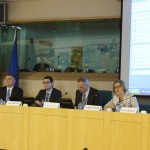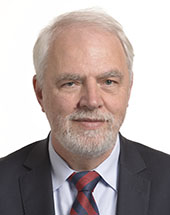URBAN-UITP seminar on Energy Efficiency and Urban Transport Systems
 “We should be more smart, more green and we should create jobs” – with these words Lambert van Nistelrooij, Vice-President of the Intergroup, concluded the URBAN Intergroup’s and International Association for Public Transport’s seminar which was held on 4th March in Brussels. Apart from typical transport problems of urbanized areas, the CO2 emission was one of the significant aspects of the discussion, bringing us to a point that partnership in developing public transport is one of the key factors of European success in implementing Europe 2020 strategy.
“We should be more smart, more green and we should create jobs” – with these words Lambert van Nistelrooij, Vice-President of the Intergroup, concluded the URBAN Intergroup’s and International Association for Public Transport’s seminar which was held on 4th March in Brussels. Apart from typical transport problems of urbanized areas, the CO2 emission was one of the significant aspects of the discussion, bringing us to a point that partnership in developing public transport is one of the key factors of European success in implementing Europe 2020 strategy.
Joachim Zeller, member of the URBAN Intergroup, said that urban transport is one of the priorities of European Regional Development Fund. “The members of the European Parliament and especially members of the URBAN Intergroup worked hard during the negotiations of the all structural funds regulations for the programming period 2014-2020. Now, the last step of implementation of the possibilities offered by the European founds is up to the countries governments and local politics”-he added.
The development should start with all citizens – changing our habits is significant. 0,7 billion of daily trips in urban areas in 2005 was private cars commuting, which means nearly 54% of all moving processes. What is more, the statistics show that only 1,2-1,3 people travels in one car. Drawing upon the knowledge of experts from UITP, the public transport is 2,5 times more energy efficient than private car (per passenger). The influence on environment is easily noticeable – doubling public transport’s market share is willing to cause more than 20% reduction of oil consumption in 2025.
Moreover, the urban transport (which includes public transport, private transport and non-motorized) is heavily dependent on oil based energy. The speakers’ solution is investing in electric or hybrid buses – developing local public transport may seem expansive, but, as examples show, payback period is possible to last no longer than 8 years. The representative of STIB-MIVB pointed out that the most challenging scenario of developing public transport has the best return on investment, creating better environment for business and growth in cities. Its examples were presented by Warsaw Metro and STIB-MIVB, which participated in the TICKET TO KYOTO project.
The local contractors of transport services assessed the partnership as worthy but complicated due to different measures and regulations concerning public transport in member states. They highlighted the need of developing knowledge and carrying out researches to facilitate co-action.




